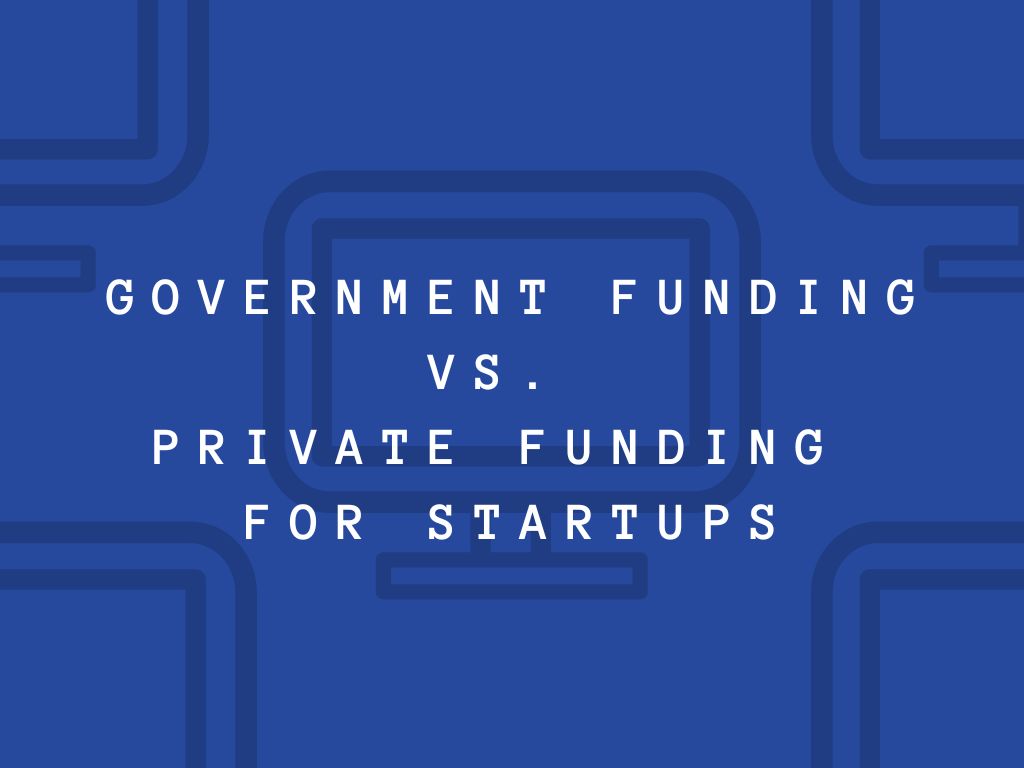Government Funding vs. Private Funding for Startups
Category: Funding & Financing
Tags: funding for business, funding for startups, Government Funding
When it comes to starting a business, there are a lot of things to think about. One of the most important decisions you’ll have to make is how you will finance your venture. There are a couple of different options available to you, each with its own set of pros and cons.
In this article, we’ll take a look at government funding and private funding to help you decide which route is right for your business.
Government Funding
One option for financing your startup is government funding.
The Canadian government offers a variety of programs and services to help businesses get off the ground. As an example; one such program is the Canadian Youth Business Foundation (CYBF). The CYBF provides financing, mentorship, and resources to young entrepreneurs between the ages of 18-34. They also offer loans of up to $15,000 with favorable interest rates.
Another option is the Scientific Research & Experimental Development Tax Incentive Program (SR&ED), which offers tax breaks to businesses that are engaged in scientific research and development.
There are however over 1,500 different government funding programs across Canada that help small business owners. These funding options come in the form of government grants, government loans, tax breaks, credits, and more.
There are a few main types of government funding programs in Canada: grants, loans, tax breaks, and credits.
Each province in Canada offers different funding programs, so it’s important to do your research and see what’s available in your area.
There are a few main types of government grants available to businesses in Canada:
1. Startup Grants
These grants are designed to help businesses with starting costs, such as marketing, research and development, and capital expenses.
2. Expansion Grants
These grants are offered to businesses who are looking to expand their operations, either by hiring new employees or by expanding their product line.
3. Community Grants
These grants are offered to businesses who are looking to give back to their community, by donating money or goods to local charities or non-profit organizations.
4. Women in Business Grants
These grants are offered specifically to women-owned businesses and provide financial assistance for things like start-up costs, training, and mentorship programs.
In addition to that, it is always a good idea to educate yourself on the types of grants; such as the non repayable grants, partial contusions..etc
You can review all government grants and funding options in the Funding Database. With currently over 1,500 government funding options, it will allow you to search all funding options in Canada, for your small business.
The government also offers loans to businesses in the form of government-backed loans and lines of credit. These loans typically have lower interest rates than traditional bank loans, and can be used for a variety of purposes, such as start-up costs, expansion, or purchasing equipment.
Government loans are usually interest-free or have low-interest rates. The repayment terms are also often more flexible than a bank loan.
There are also a number of tax breaks and credits available to businesses in Canada. These include things like the Small Business deduction, which allows small businesses to deduct a portion of their income from taxes, and the Research & Development Tax Credit, which provides a tax credit for businesses that are engaged in scientific research and development.
Tax breaks and credits can help reduce the amount of taxes you
Private Funding
Another option for financing your startup is private funding. This can come in the form of investments from friends, family, or banks, private investors and venture capitalists.
One advantage of private funding is that you retain full control over your company. However, one downside is that you may have to give up a larger portion of equity in your company. You will also be under more pressure to perform as your investors will be expecting a return on their investment.
While private funding is often helpful, it can also be costly to your business. The goal that most private lenders have in mind is to make the money back + interest; while the government funding options want you to succeed with your business so that long-term, the government benefits via job creation, taxes..etc
Which route you choose will ultimately depend on your specific needs and circumstances. There are advantages and disadvantages to both government funding and private funding. If you’re not sure which path to take, it’s always a good idea to speak with a professional who can advise you on which route would be best for your business.
SEARCHES RELATED TO FUNDING FOR BUSINESS
I WANT START A BUSINESS IN...
IS THERE HELP IN MY INDUSTRY?
- Expansion Capital
- Funding For Equipment
- Business Acquisition Funding
- Consulting Services
- Hiring & Training Staff
- Management Support Services
- Manufacturing
- Mining
- Professional and IT Services
- Transportation and Warehousing
- Accommodation and Food Services
- Agriculture
- Construction
- Culture and Recreation
- Finance and Real Estate
- Forestry, Hunting and Fishing
- Health and Social Assistance





